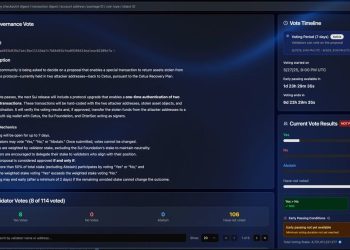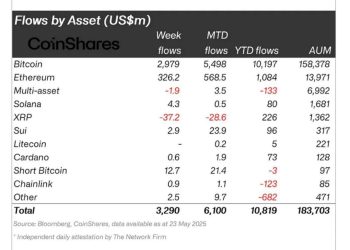The Alpenglow fork proposes moving the Solana blockchain to proof-of-stake consensus in its ‘biggest change ever.’
Solana Labs spinoff Anza has proposed a significant change to the blockchain’s consensus mechanism, ditching proof-of-history (PoH) for proof-of-stake (PoS).
Unveiled last week at the Solana Accelerate conference in New York, the Alpenglow hard fork would cut the time taken for blocks to finalize to as little as 150 milliseconds. That’s fast enough for the Layer 1 blockchain to compete with Layer 2s for high-speed trading applications.
“Alpenglow will be a turning point for Solana. Alpenglow is not only a new consensus protocol, but the biggest change to Solana’s core protocol since, well, ever,” Anza co-founders Roger Wattenhofer, Quentin Kniep and Kobi Sliwinski said in a blog post.
Solana’s block finality is currently 12.8 seconds, with optimistic confirmations — which Wattenhofer described onstage at Accelerate as being “sort of sure” that a block will be approved — at about 500 to 600 milliseconds. Simulations show Alpenglow would achieve finality in about 150 milliseconds.
“A median latency of 150ms does not just mean that Solana is fast,” Wattenhofer, Kniep and Sliwinski said. “It means Solana can compete with Web2 infrastructure in terms of responsiveness, potentially making blockchain technology viable for entirely new categories of applications that demand real-time performance.”
Yakovenko Approves
Alpenglow achieves this speed with two components. These are Votor, which deals with voting transactions and block finalization, and Rotor, which would replace Solana’s proof-of-history consensus mechanism with a proof-of-stake system.
Votor would finalize blocks in one round of voting if 80% of stakers are participating, and two rounds if only 60% respond, according to an X post by Solana co-founder Anatoly Yakovenko.
“The distinctive ‘20+20’ resilience allows the protocol to operate effectively even under harsh network conditions, tolerating up to 20% adversarial stake and an additional 20% non-responsive stake,” Wattenhofer, Kniep and Sliwinski said.
“I got nearly everything wrong about consensus, except the important parts: it can’t be in the way of block producers utilizing 100% of the bandwidth 100% of the time, [and] users need some deterministic finality in one round (2-delta),” wrote Yakovenko.
“Alpenglow nails both of these requirements with a simple and elegant design that’s really easy to intuit,” he added.
Garzik Skeptical
Bitcoin core developer Jeff Garzik, who was building Bitcoin as far back as the Satoshi Nakamoto days, told The Defiant on a Zoom call that that kind of speed is impossible without security compromises.
Garzik is developing the Hemi blockchain, a Bitcoin Layer 2 with Ethereum Virtual Machine (EVM) compatibility that has a 12-second finality.
Asked about blockchain security, he said that “there’s a certain speed beyond which you literally can’t go over a fiber optic cable through the ocean to another continent and then back again within a certain number of milliseconds. And if you’re faster than that, you’re just giving up decentralization for speed. And when you do that, you’re also giving up security for speed.”
Pointing to Solana’s history of getting stuck and needing to restart the blockchain, Garzik said that Solana is “not 100% bombproof today, and that’s why we’re building on Bitcoin and Ethereum and not Solana.”
While he admires the energy of Solana users and would “love to connect technologically with them,” Garzik said that he thinks Hemi and Bitcoin, while slower, are “far more secure.”
Solana’s Stellar Year
Solana is having a very good year, outperforming other Layer 1s in token price, but also in ecosystem revenue, driven largely by the memecoin craze.
With a market capitalization of $90 billion, it is the sixth-largest cryptocurrency and recently hit a new all-time high for stablecoins deployed on the blockchain.
Solana is also considered to be one of the more likely tokens to be approved for an exchange-traded fund (ETF) by the Securities and Exchange Commission (SEC). However, the SEC has delayed action on several Solana ETF proposals, looking into concerns about market manipulation and investor protection.
#Solana #Seeks #150ms #Finality #Alpenglow #Upgrade






















